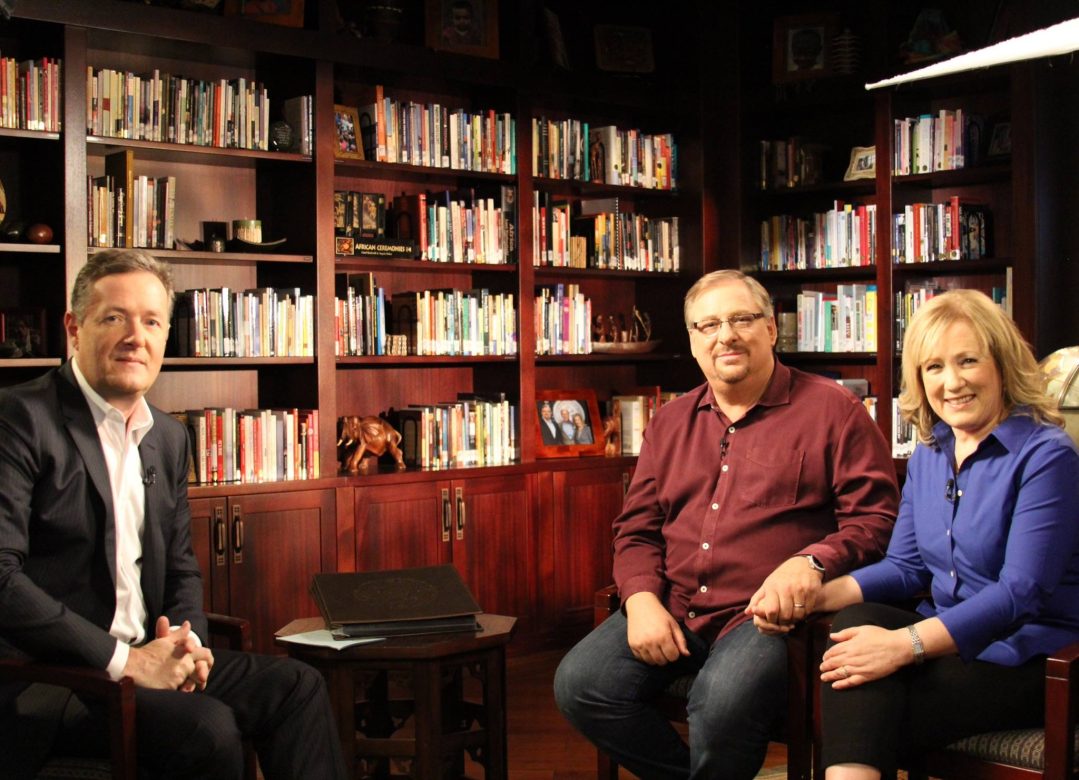In this new series, City News looks at how contemporary and historical Christian leaders turn to God when faced with crises. In this first instalment, we look at how God used Rick Warren and his wife Kay, founders of Saddleback Church, to address the stigma of mental illness in the church and in greater society after they lost their son to suicide.

Rick and Kay Warren retired from leading Saddleback Church in 2021
“Your greatest ministry will flow out of your greatest pain.” ~ Rick Warren
On 28 July 2013, Rick Warren and his wife Kay, walked out onto the stage of Saddleback Church in California, and received a standing ovation from the congregation. It was the first time the couple had returned to the pulpit after nearly four months. He was dressed in a dark V neck tee and jeans; she, in an aqua blue blouse and leggings. They held hands, visibly moved by the support they had received since their son’s death.
Looking emotional and weary, Pastor Rick placed his hand on his heart and motioned to the congregation a thank you, before hugging his wife and placing his Bible on the rostrum. As the applause died down and Kay began leaving the stage, a congregation member yelled out, “We love you!” Pastor Rick laughed and replied, “Have I told you lately that I love you?” Moments later, the best-selling author of The Purpose Driven Life—a man often referred to by the media as “America’s pastor”, began one of the most difficult sermons of his celebrated church career, titled, “How To Get Through What You’re Going Through”.
Watch the sermon here
A PARENT’S WORST FEAR
On 5 April 2013, Rick and Kay Warren’s youngest son, Matthew, 27, died from a self-inflicted gun wound from an illegally modified firearm he had bought online. Matthew Warren had suffered from debilitating depression and mental illness most of his life: he was first misdiagnosed as being bipolar, and later accurately diagnosed with Borderline Personality disorder. The Warrens rallied around their son, dealing with his mood swings and suicide ideation through his teenage and young adult life. But in the decade leading up to Matthew’s death, even after extensive medical and psychological intervention, they knew they were fighting a losing battle for their son’s life.
Desperate to escape the torment he faced, Matthew tried to purchase Nembutal, a prescriptive sedative and barbiturate that depresses the central nervous system. Often prescribed in the treatment of insomnia and anxiety, Nembutal, when abused, can be lethal, shutting down the brain’s ability to control breathing and heart rate. He failed to purchase the drug online and was once even sold poison labelled “peaceful potions”. Such was his desperation in wanting to end his suffering.
Looking for other means to take his life, Matthew tried many times to purchase a handgun but was repeatedly denied by California’s stringent gun laws that prohibit gun ownership to those who have been diagnosed with serious mental illness.
Desperate to end his pain, Matthew managed to illegally acquire an unregistered gun online, and after purchasing the firearm, he informed his parents, who were crippled by the fact that he threatened to kill himself instantly if they called the police to report him.
TURNING HURT INTO HELP
In the aftermath of Matthew’s suicide, before he returned to preaching at Saddleback Church, Pastor Rick took time off from leading his church to spend time with God and his wife, trying to come to terms with the loss of his son. During his time of solitude listening for God, Warren’s family received over 30,000 letters of condolence from a wide spectrum of society. Of all the messages that came from presidents, prime ministers, rock stars, media personalities, and many in the body of Christ, the letters that touched the pastor the most were those that came from the people that his son had led to the Lord. Caught in the bittersweet tears of celebration for the salvation of the lost and the heart-breaking loss of his son, Pastor Rick wrote in his journal that in God’s garden of grace, even broken trees bear fruit, and we are all broken.
Amid the nationwide media storm created by their son’s death, the Warrens made a decision to grieve publicly and to share their son’s story of mental illness via Facebook and Twitter. In response, the couple were inundated with over 10,000 messages asking for help. Through this, they discovered that the issue of mental illness in American society was bigger than they realised.

The Warrens on Piers Morgan Live in 2013
The Warrens gave their first interview since their son’s death in September that year, on Piers Morgan Live on CNN. Morgan asked Pastor Rick whether he, as America’s pastor, could have done more on the issue of mental health before his own son took his life. In his reply, the pastor replied, “Piers, we’ve always known … that one day we would be spokespeople for mental illness. Kay and I have known this for years and years. The reason we were quiet was primarily to protect Matthew’s dignity. It was his story to tell. And so, we were always praying that either a) he’d be healed miraculously, or b) we’ll get treatment, therapy, medicine that helps him manage his disease for the rest of his life, and then he can tell his story. So the only reason that held us back on being public figures on this—like we have been for HIV/Aids and things like that—was his own dignity. And of course, after he died, that issue was gone…”
GOD’S HAND IN THE COMMUNITY
Just over six months after the interview, Pastor Rick announced that Saddleback Church would be hosting The Gathering On Mental Health And The Church, an event to raise awareness of those suffering from mental illness and how the modern day church can help those suffering in the community.
Speaking to Associated Press in February 2014 at the event’s announcement, Pastor Rick shared his heart hoping that other churches would take their lead in initiating mental health plans in their ministry. “Our goal is that, we crack the door open [to the awareness of mental illness],” he said, “and the churches go okay, if the diocese is doing this, if Saddleback Church is doing this, we can do this, and we would love to see a movement started where people start to think that they need to add this element to their local ministry.”
The event, held in April 2014, was attended by 3,000 (and another 6,000 online) who were keen to hear Christian church leaders, leading mental health experts and health care advocates speak on how mental illness is affecting the church and how the church can be used to fight against an illness that a quarter of all Americans suffer from.
Among the many personal testimonies given by those suffering from mental illness, Pastor Rick shared his own personal battles with the illness in the hope of breaking the stigma associated with people seeking help for their sickness. “I’m not an authority on mental illness, but I am an authority on living with mental illness,” he told the audience. “We wanted to pull back the curtain and say, ‘It’s okay. I’m not okay, you’re not okay, but that’s okay because God’s okay.’”
In the wake of the overwhelming success of the event, Saddleback Church launched the Hope for Mental Health website, basing the outreach on Scriptures such as John 15:15, Galatians 5:13 and Romans 15:13. The site features extensive resources for church leaders to begin their own mental health ministries, and is filled with encouraging testimonies from Christians who are dealing with mental illness in their life.
Aside from Saddleback Church’s efforts in helping those with mental illness, Kay Warren has stepped out as a Suicide Prevention and Mental Health Advocate to ministers and media organisations across America. Speaking to CNN in 2016, she said that once her husband started talking about mental illness in church, “it gave many people the courage to come forward,” further stating that, “I really can’t even count in the last two and a half years how many people have come up to me and said Matthew’s suicide has caused them to decide not to take their lives.”
REDEMPTIVE SUFFERING
In a television interview with Praise on TBN in 2021, Pastor Rick talked about what he had learnt from the passing of his son in 2013. Still deeply moved eight years after the tragedy, the pastor believes that God uses pain to be a witness for Him, and that in the throes of pain, a Christian’s greatest witness to the world is how they handle that pain. He admitted candidly that he had never asked for the mental health ministry that God had given him and Kay, but that he learned that we all go through pain in life and we should not waste the opportunity to use that pain to help others.
He continues to use the pain of his son’s death to help others, even after retiring from leading Saddleback Church in 2021, through his website Pastor Rick.Com.
In one devotional titled “The Purpose Of Your Pain”, he quotes, “In our trouble God has comforted us—and this, too, to help you: to show you from our personal experience how God will tenderly comfort you when you undergo these same sufferings. He will give you the strength to endure.” 2 Corinthians 1:6 -7 (TLB)
In these verses, we see the parallels of the comfort the Apostle Paul received from Christ which extended to the church of Corinth, and how God comforted Pastor Rick, enabling him to be an voice of hope to those who are suffering.
Standing up as advocates for mental illness in America in spite of their own tragic loss, Rick and Kay Warren took their hurt and reached out to a stigmatised and marginalised group of people who were too afraid to speak for themselves, releasing them from shame. The countless lives that they have impacted are a testimony of God’s love and compassion for the hurting, and a witness to how God is near to the broken-hearted and saves those who are crushed in spirit, all across the world.
